2023届高考英语二轮复习语法:现在完成进行时课件(共22张PPT)
文档属性
| 名称 | 2023届高考英语二轮复习语法:现在完成进行时课件(共22张PPT) |  | |
| 格式 | pptx | ||
| 文件大小 | 1.0MB | ||
| 资源类型 | 教案 | ||
| 版本资源 | 通用版 | ||
| 科目 | 英语 | ||
| 更新时间 | 2023-03-13 12:57:57 | ||
图片预览

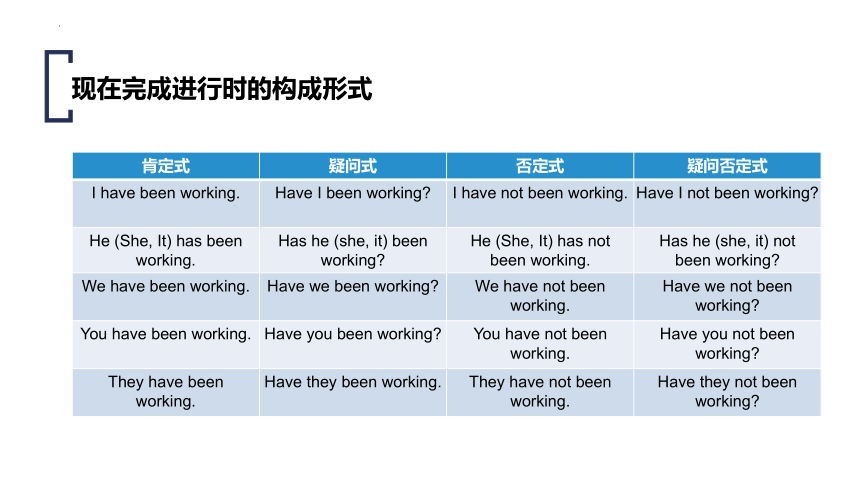
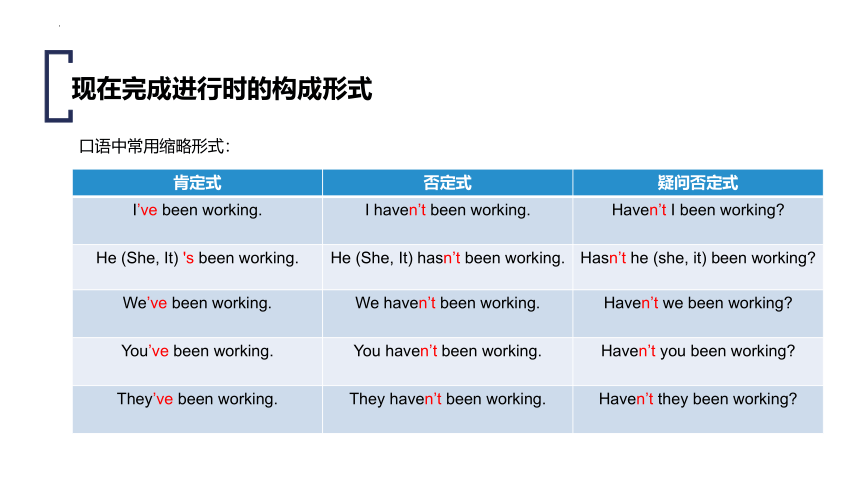
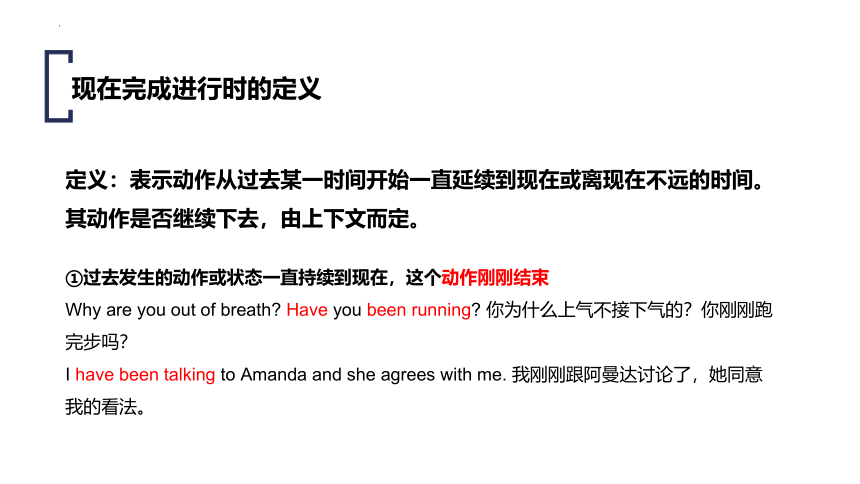

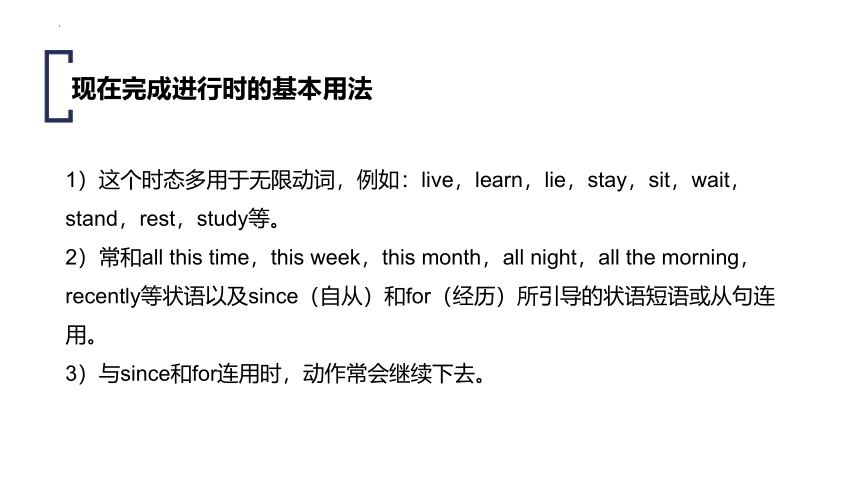
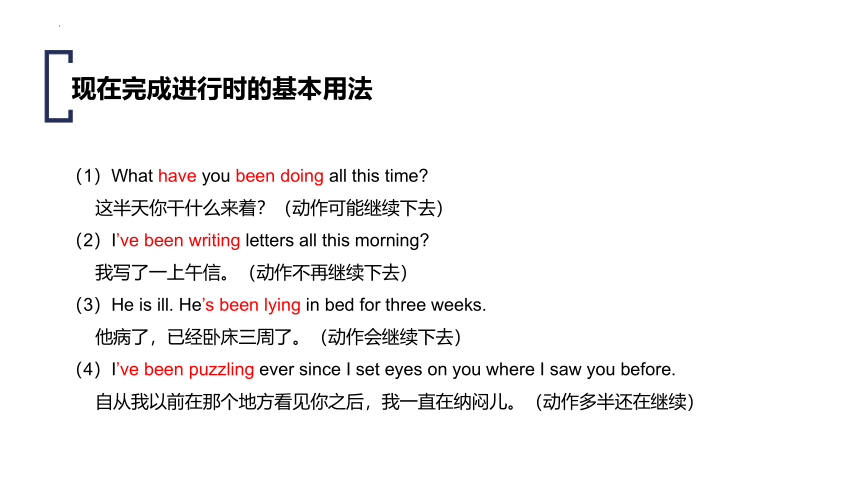
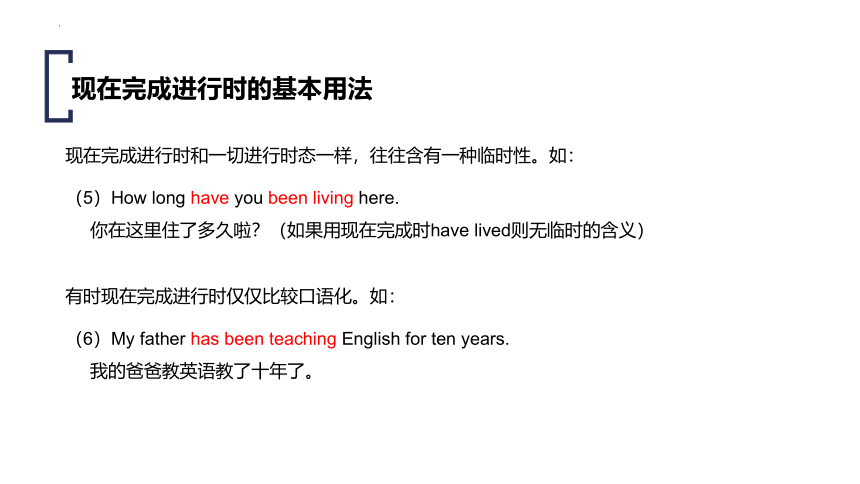
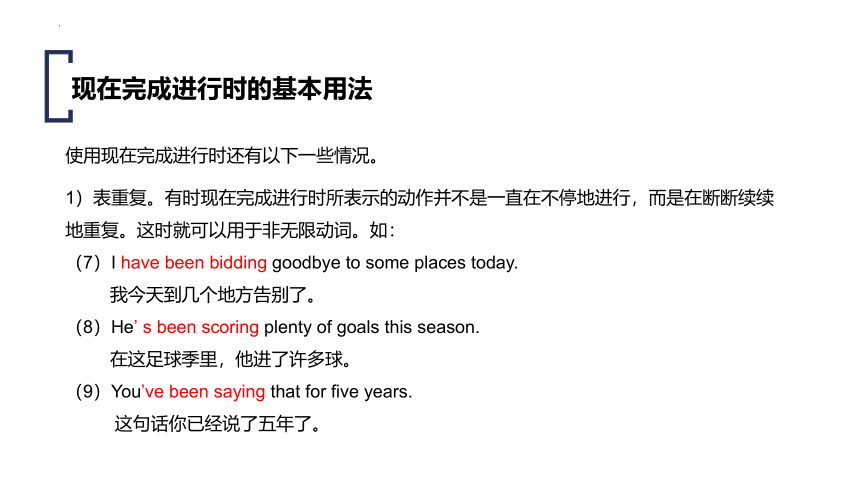
文档简介
(共22张PPT)
英语语法体系——
现在完成进行时(Present perfect continuous )
现在完成进行时的构成形式
肯定式 疑问式 否定式 疑问否定式
I have been working. Have I been working I have not been working. Have I not been working
He (She, It) has been working. Has he (she, it) been working He (She, It) has not been working. Has he (she, it) not been working
We have been working. Have we been working We have not been working. Have we not been working
You have been working. Have you been working You have not been working. Have you not been working
They have been working. Have they been working. They have not been working. Have they not been working
现在完成进行时的构成形式
肯定式 否定式 疑问否定式
I’ve been working. I haven’t been working. Haven’t I been working
He (She, It) 's been working. He (She, It) hasn’t been working. Hasn’t he (she, it) been working
We’ve been working. We haven’t been working. Haven’t we been working
You’ve been working. You haven’t been working. Haven’t you been working
They’ve been working. They haven’t been working. Haven’t they been working
口语中常用缩略形式:
现在完成进行时的定义
定义:表示动作从过去某一时间开始一直延续到现在或离现在不远的时间。其动作是否继续下去,由上下文而定。
①过去发生的动作或状态一直持续到现在,这个动作刚刚结束
Why are you out of breath Have you been running 你为什么上气不接下气的?你刚刚跑完步吗?
I have been talking to Amanda and she agrees with me. 我刚刚跟阿曼达讨论了,她同意我的看法。
现在完成进行时的定义
定义:表示动作从过去某一时间开始一直延续到现在或离现在不远的时间。其动作是否继续下去,由上下文而定。
②过去发生的动作或状态一直持续到现在,这个动作还有可能继续持续
Ben is watching TV. He has been watching TV all day. 本正在看电视。他已经看了一天电视了。
现在完成进行时的基本用法
1)这个时态多用于无限动词,例如:live,learn,lie,stay,sit,wait,stand,rest,study等。
2)常和all this time,this week,this month,all night,all the morning,recently等状语以及since(自从)和for(经历)所引导的状语短语或从句连用。
3)与since和for连用时,动作常会继续下去。
现在完成进行时的基本用法
(1)What have you been doing all this time
这半天你干什么来着?(动作可能继续下去)
(2)I’ve been writing letters all this morning
我写了一上午信。(动作不再继续下去)
(3)He is ill. He’s been lying in bed for three weeks.
他病了,已经卧床三周了。(动作会继续下去)
(4)I’ve been puzzling ever since I set eyes on you where I saw you before.
自从我以前在那个地方看见你之后,我一直在纳闷儿。(动作多半还在继续)
现在完成进行时的基本用法
(5)How long have you been living here.
你在这里住了多久啦?(如果用现在完成时have lived则无临时的含义)
现在完成进行时和一切进行时态一样,往往含有一种临时性。如:
(6)My father has been teaching English for ten years.
我的爸爸教英语教了十年了。
有时现在完成进行时仅仅比较口语化。如:
现在完成进行时的基本用法
1)表重复。有时现在完成进行时所表示的动作并不是一直在不停地进行,而是在断断续续地重复。这时就可以用于非无限动词。如:
(7)I have been bidding goodbye to some places today.
我今天到几个地方告别了。
(8)He’ s been scoring plenty of goals this season.
在这足球季里,他进了许多球。
(9)You’ve been saying that for five years.
这句话你已经说了五年了。
使用现在完成进行时还有以下一些情况。
现在完成进行时的基本用法
2)有感彩。现在完成时和一切进行时态一样也可以带有感彩。如:
(10)Too much has been happening today.
今天发生了太多事情了。
(11)Fiddlesticks! Who’s been telling you such stuff
乱弹琴!谁和你说的这些胡话?
使用现在完成进行时还有以下一些情况。
现在完成进行时的基本用法
3)时间状语的省略。现在完成进行时在上下文清楚时可以不用时间状语。这种现在完成时多指“刚才”或“近来”发生的动作,一般不再继续,并往往含有一种直接的结果。如:
(12)You’ve been working too hard.
你工作太辛苦了。(直接结果可能是:你一定很累了)
(13)Who’s been insulting you
谁欺负你了?(对方可能在哭或有其他表现)
使用现在完成进行时还有以下一些情况。
现在完成进行时的基本用法
(14)We have been cleaning the classroom.
我们打扫教室来着。(刚打扫过,直接结果可能是:我们身上很脏。如果用现在完
成时have cleaned则不一定是刚才打扫的,也可能是昨天打扫的,其结果是:教室
很干净,可以用了)
现在完成进行时的基本用法
(15)My hands are dirty. I’ve been painting the door.
我的手脏,我在漆门来着。
(16)What have you been eating to get as fat as this
你吃什么啦,怎么这么胖?
有时说话人道出了直接结果。如:
现在完成进行时的基本用法
(17)Since that unfortunate accident last week, I haven’t been sleeping at all well.
自从上周发生了那次不幸事故之后,我一直睡得很不好。
(18)He hasn’t been working for me and I haven’t had that much contact with him.
他并没有给我工作过,我和他没有过那许多接触。
在当代英语中,可用否定结构。如:
1. We _____ COVID-19 ever since it appeared three years ago.
A. have been fighting against B. fought with
C. have been fighting for D. will be fighting against
2. Good heavens! He _____ dinner since 4 p.m. and it is 10 p.m. now!
A. is preparing B. had been prepared
C. has prepared D. has been preparing
3. Cambridge University says it _____ gaokao scores for years, requiring the admitted students to rank in the top 0.1 precent on the test in their province.
A. has been considering B. had considered
C. is considering D. considers
A
D
A
4. The washing machine _____ all morning. What on earth are you washing
A. has been running B. had run
C. was running D. will run
5. She ought to stop working. She has a headache because she _____ all day long.
A. has been reading B. had read C. is reading D. read
6. Ever since the Greens moved to the country a year ago, they _____ better health.
A. are enjoying B. have been enjoying
C. could have enjoyed D. had enjoyed
A
D
B
7. For some time now, world leaders _____ out the necessity for agreement on arms reduction.
A. pointed B. were pointing
C. have been pointing D. had been pointing
8. Don’t disturb me. I _____ the letters all morning and _____ ten so far.
A. write; wrote B. am writing; have written
C. was writing; wrote D. have been writing; have written
9. The professor went to his office two hours ago and _____ his essay ever since.
A. was writing B. had written C. wrote D. has been writing
A
D
D
现在进行时 VS 现在完成进行时
Don’t disturb me now. I’m working.
I have been doing
现在完成进行时
I am doing
现在进行时
now
now
I’ve been working hard. Now I’m going to have a break.
强调正在做的事情
强调所做事情的持久、持续
Put the verb into the present perfect continuous or the present continuous.
1. _________________ (Maria/ learn) English for two years.
2. Hi, Tom. ______________ (I/ look) for you. I need to ask you something.
3. Why ____________ (you/ look) at me like that Stop it!
4. Rachel is a teacher. ________________ (she/ teach) for ten years.
5. ______________ (I/ think) about what you said and I’ve decided to take your advice.
6. ‘Is Paul on holiday this week ’ “No, __________ (he/ work).’
7. Sarah is very tired. ________________ (she/ work) very hard recently.
8. It’s dangerous to use your phone when __________ (you/ drive).
9. Laura _____________ (travel) in South America for the last three months.
Maria has been learning
I have been looking
are you looking
She has been teaching
I have been thinking
he is working
She has been working
you are driving
has been traveling
现在完成进行时 VS 现在完成时
现在完成进行时强调发生在过去的动作持续进行,还有可能继续下去。
现在完成时强调发生在过去的动作已经完成。
Put the verb into the present perfect simple or continuous.
1. Where have you been ________________ (you/ play) tennis
2. Look! _______________ (somebody/ break) that window.
3. You look tired. ________________ (you/ work) hard
4. ‘ ________________ (you/ ever/ work) in a factory ’ “No, never.’
5. Where’s Lisa Where __________ (she/ go)
6. This is a very old book. __________ (I/ have) it since I was a child.
7. ‘Have you been busy ’ ‘No, _______________ (I/ watch) TV.’
8. My brother is an actor. ____________ (he/ appear) in several films.
9. ‘Sorry I’m late.’ “That’s all right. _______________ (I/ not/ wait) long.’
10. Are you OK You look as if _______________ (you/ cry).
11. ’Is it still raining ’ ‘No, __________ (it/ stop).’
Have you been playing
Somebody has broken
Have you been working
Have you ever worked
has she gone
I have had
I have been watching
He has appeared
I haven’t been waiting
you have been crying
it has stopped
12. The children are tired now. ________________ (they/ play) in the garden.
13. ________ (I/ lose) my phone. __________ (you/ see) it
14. ______________(I/ read) the book you lent me, but ___________ (I/ not/ finish) it yet. It’s really interesting.
15. ________ (I/ read) the book you lent me, so you can have it back now.
They have been playing
I have lost
Have you seen
I have been reading
I haven’t finished
I have read
英语语法体系——
现在完成进行时(Present perfect continuous )
现在完成进行时的构成形式
肯定式 疑问式 否定式 疑问否定式
I have been working. Have I been working I have not been working. Have I not been working
He (She, It) has been working. Has he (she, it) been working He (She, It) has not been working. Has he (she, it) not been working
We have been working. Have we been working We have not been working. Have we not been working
You have been working. Have you been working You have not been working. Have you not been working
They have been working. Have they been working. They have not been working. Have they not been working
现在完成进行时的构成形式
肯定式 否定式 疑问否定式
I’ve been working. I haven’t been working. Haven’t I been working
He (She, It) 's been working. He (She, It) hasn’t been working. Hasn’t he (she, it) been working
We’ve been working. We haven’t been working. Haven’t we been working
You’ve been working. You haven’t been working. Haven’t you been working
They’ve been working. They haven’t been working. Haven’t they been working
口语中常用缩略形式:
现在完成进行时的定义
定义:表示动作从过去某一时间开始一直延续到现在或离现在不远的时间。其动作是否继续下去,由上下文而定。
①过去发生的动作或状态一直持续到现在,这个动作刚刚结束
Why are you out of breath Have you been running 你为什么上气不接下气的?你刚刚跑完步吗?
I have been talking to Amanda and she agrees with me. 我刚刚跟阿曼达讨论了,她同意我的看法。
现在完成进行时的定义
定义:表示动作从过去某一时间开始一直延续到现在或离现在不远的时间。其动作是否继续下去,由上下文而定。
②过去发生的动作或状态一直持续到现在,这个动作还有可能继续持续
Ben is watching TV. He has been watching TV all day. 本正在看电视。他已经看了一天电视了。
现在完成进行时的基本用法
1)这个时态多用于无限动词,例如:live,learn,lie,stay,sit,wait,stand,rest,study等。
2)常和all this time,this week,this month,all night,all the morning,recently等状语以及since(自从)和for(经历)所引导的状语短语或从句连用。
3)与since和for连用时,动作常会继续下去。
现在完成进行时的基本用法
(1)What have you been doing all this time
这半天你干什么来着?(动作可能继续下去)
(2)I’ve been writing letters all this morning
我写了一上午信。(动作不再继续下去)
(3)He is ill. He’s been lying in bed for three weeks.
他病了,已经卧床三周了。(动作会继续下去)
(4)I’ve been puzzling ever since I set eyes on you where I saw you before.
自从我以前在那个地方看见你之后,我一直在纳闷儿。(动作多半还在继续)
现在完成进行时的基本用法
(5)How long have you been living here.
你在这里住了多久啦?(如果用现在完成时have lived则无临时的含义)
现在完成进行时和一切进行时态一样,往往含有一种临时性。如:
(6)My father has been teaching English for ten years.
我的爸爸教英语教了十年了。
有时现在完成进行时仅仅比较口语化。如:
现在完成进行时的基本用法
1)表重复。有时现在完成进行时所表示的动作并不是一直在不停地进行,而是在断断续续地重复。这时就可以用于非无限动词。如:
(7)I have been bidding goodbye to some places today.
我今天到几个地方告别了。
(8)He’ s been scoring plenty of goals this season.
在这足球季里,他进了许多球。
(9)You’ve been saying that for five years.
这句话你已经说了五年了。
使用现在完成进行时还有以下一些情况。
现在完成进行时的基本用法
2)有感彩。现在完成时和一切进行时态一样也可以带有感彩。如:
(10)Too much has been happening today.
今天发生了太多事情了。
(11)Fiddlesticks! Who’s been telling you such stuff
乱弹琴!谁和你说的这些胡话?
使用现在完成进行时还有以下一些情况。
现在完成进行时的基本用法
3)时间状语的省略。现在完成进行时在上下文清楚时可以不用时间状语。这种现在完成时多指“刚才”或“近来”发生的动作,一般不再继续,并往往含有一种直接的结果。如:
(12)You’ve been working too hard.
你工作太辛苦了。(直接结果可能是:你一定很累了)
(13)Who’s been insulting you
谁欺负你了?(对方可能在哭或有其他表现)
使用现在完成进行时还有以下一些情况。
现在完成进行时的基本用法
(14)We have been cleaning the classroom.
我们打扫教室来着。(刚打扫过,直接结果可能是:我们身上很脏。如果用现在完
成时have cleaned则不一定是刚才打扫的,也可能是昨天打扫的,其结果是:教室
很干净,可以用了)
现在完成进行时的基本用法
(15)My hands are dirty. I’ve been painting the door.
我的手脏,我在漆门来着。
(16)What have you been eating to get as fat as this
你吃什么啦,怎么这么胖?
有时说话人道出了直接结果。如:
现在完成进行时的基本用法
(17)Since that unfortunate accident last week, I haven’t been sleeping at all well.
自从上周发生了那次不幸事故之后,我一直睡得很不好。
(18)He hasn’t been working for me and I haven’t had that much contact with him.
他并没有给我工作过,我和他没有过那许多接触。
在当代英语中,可用否定结构。如:
1. We _____ COVID-19 ever since it appeared three years ago.
A. have been fighting against B. fought with
C. have been fighting for D. will be fighting against
2. Good heavens! He _____ dinner since 4 p.m. and it is 10 p.m. now!
A. is preparing B. had been prepared
C. has prepared D. has been preparing
3. Cambridge University says it _____ gaokao scores for years, requiring the admitted students to rank in the top 0.1 precent on the test in their province.
A. has been considering B. had considered
C. is considering D. considers
A
D
A
4. The washing machine _____ all morning. What on earth are you washing
A. has been running B. had run
C. was running D. will run
5. She ought to stop working. She has a headache because she _____ all day long.
A. has been reading B. had read C. is reading D. read
6. Ever since the Greens moved to the country a year ago, they _____ better health.
A. are enjoying B. have been enjoying
C. could have enjoyed D. had enjoyed
A
D
B
7. For some time now, world leaders _____ out the necessity for agreement on arms reduction.
A. pointed B. were pointing
C. have been pointing D. had been pointing
8. Don’t disturb me. I _____ the letters all morning and _____ ten so far.
A. write; wrote B. am writing; have written
C. was writing; wrote D. have been writing; have written
9. The professor went to his office two hours ago and _____ his essay ever since.
A. was writing B. had written C. wrote D. has been writing
A
D
D
现在进行时 VS 现在完成进行时
Don’t disturb me now. I’m working.
I have been doing
现在完成进行时
I am doing
现在进行时
now
now
I’ve been working hard. Now I’m going to have a break.
强调正在做的事情
强调所做事情的持久、持续
Put the verb into the present perfect continuous or the present continuous.
1. _________________ (Maria/ learn) English for two years.
2. Hi, Tom. ______________ (I/ look) for you. I need to ask you something.
3. Why ____________ (you/ look) at me like that Stop it!
4. Rachel is a teacher. ________________ (she/ teach) for ten years.
5. ______________ (I/ think) about what you said and I’ve decided to take your advice.
6. ‘Is Paul on holiday this week ’ “No, __________ (he/ work).’
7. Sarah is very tired. ________________ (she/ work) very hard recently.
8. It’s dangerous to use your phone when __________ (you/ drive).
9. Laura _____________ (travel) in South America for the last three months.
Maria has been learning
I have been looking
are you looking
She has been teaching
I have been thinking
he is working
She has been working
you are driving
has been traveling
现在完成进行时 VS 现在完成时
现在完成进行时强调发生在过去的动作持续进行,还有可能继续下去。
现在完成时强调发生在过去的动作已经完成。
Put the verb into the present perfect simple or continuous.
1. Where have you been ________________ (you/ play) tennis
2. Look! _______________ (somebody/ break) that window.
3. You look tired. ________________ (you/ work) hard
4. ‘ ________________ (you/ ever/ work) in a factory ’ “No, never.’
5. Where’s Lisa Where __________ (she/ go)
6. This is a very old book. __________ (I/ have) it since I was a child.
7. ‘Have you been busy ’ ‘No, _______________ (I/ watch) TV.’
8. My brother is an actor. ____________ (he/ appear) in several films.
9. ‘Sorry I’m late.’ “That’s all right. _______________ (I/ not/ wait) long.’
10. Are you OK You look as if _______________ (you/ cry).
11. ’Is it still raining ’ ‘No, __________ (it/ stop).’
Have you been playing
Somebody has broken
Have you been working
Have you ever worked
has she gone
I have had
I have been watching
He has appeared
I haven’t been waiting
you have been crying
it has stopped
12. The children are tired now. ________________ (they/ play) in the garden.
13. ________ (I/ lose) my phone. __________ (you/ see) it
14. ______________(I/ read) the book you lent me, but ___________ (I/ not/ finish) it yet. It’s really interesting.
15. ________ (I/ read) the book you lent me, so you can have it back now.
They have been playing
I have lost
Have you seen
I have been reading
I haven’t finished
I have read
